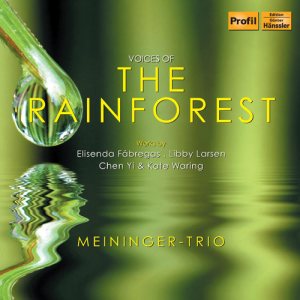 |
 |
|


alternatively
CD: MDT
AmazonUK
AmazonUS
Sound
Samples & Downloads |
Elisenda FÁBREGAS (b.
1955)
Voices of the Rainforest (2007)
Awakening [4:01]
Sago gatherers [2:59]
Evening rainstorm [3:51]
Voices of inside night [6:22]
Night spirits [4:22]
Kate WARING (b. 1953)
Alapana [7:50] (1978)
Libby LARSEN (b. 1950)
Slow Structures (2004)
Mad Wind's Night Work [2:57]
Slow Structures [6:39]
Silent Syllables [2:37]
Snow-Melting Time [5:56]
Chen YI (b. 1953)
Night Thoughts (2004) [8:30]
 Meininger Trio (Christiane Meininger (flute), Francoise Groben (cello),
Rainer Gepp (piano))
Meininger Trio (Christiane Meininger (flute), Francoise Groben (cello),
Rainer Gepp (piano))
rec. 18-21 January 2010, Bayerische Rundfunk - Studio Franken, Studio
1, Nuremberg, Germany
 HÄNSSLER PROFIL PH11039 [56:39]
HÄNSSLER PROFIL PH11039 [56:39]
|
|
|
In this age of heightened eco-awareness a CD such as this might
suggest a worthy but anodyne collection of ‘mood pieces’
that once auditioned is soon forgotten. Nothing could be further
from the truth, for these are works of rigour and reward, very
well performed by the Meininger Trio. This ensemble was founded
in 2000, yet the liner-notes indicate they’ve earned an
enviable reputation in just a few years. As for this music,
it's blessed with pleasing vigour and sustained invention.
Barcelona-born Elisenda Fábregas’s Voices of
the Rainforest starts in the steaming jungles of Papua New
Guinea; from the absorbing evocations of Awakening -
a dawn chorus like no other - to the welcome patter of rain
in Evening rainstorm the writing is plain and pithy;
yes, there are the usual onomatopoeia - the deluge ends with
a gentle, slowing ‘drip’ for the piano - but it’s
discreetly done. Christiane Meininger’s alto-flute playing
is agile and atmospheric, Francoise Groben’s opening cello
tune wonderfully warm and eloquent. The recorded balance is
close but not bleached, so individual timbres - in the night
music for instance - are keenly registered.
American composer Kate Waring’s Alapana takes us
west, to India, whose profound mysteries are evoked by a sinuous
cello line and piano strings plucked from within the body of
the instrument itself. That the now twining, now animated flute
doesn’t sound at all hackneyed is testimony to Waring’s
tasteful writing and Meininger’s artfully shaded playing.
Alapana ends as it began, with the musical equivalent
of a cinematic fade to black. This is a gorgeous piece, and
one that beckoned me back several times during the course of
this review.
Libby Larsen’s Slow Structures - a response to
the frozen landscapes of Minnesota; it’s an etched and
, angular take on the vicissitudes of life in this northern
state’s hostile winters, so mercilessly portrayed in the
Coen brothers’ dark thriller Fargo. The eponymous
Slow Structures is an ice castle of cold beauty and pure
stillness, its sculpted flute lines underpinned by a mesmeric
cello tune and a restless piano part. This is music of rarefied
loveliness, and this trio shape and project it superbly; indeed,
Silent Syllables is simply ravishing, the contrasting
optimism and warmth of the snow melt a sure harbinger of Spring.
Larsen’s subtle range of colours, textures and rhythms
is astonishing, making Slow Structures the most accomplished
and memorable piece here.
If Larsen’s landscape changes with glacial slowness, the
Chinese composer Chen Yi’s Night Thoughts moves
with rather more alacrity. Based on an ancient poem by Li Bai
(701-762) its distinctly eastern sound world - what gorgeous,
fibrillating flute figures - merges seamlessly with a chunkier
western idiom, epitomised by trenchant writing for the cello
and piano. Really, it’s the enchanted flute playing that
hovers in, and haunts, the mind long after the music has ebbed
into the silence from which it sprang.
What a discoveries this trio and these works have turned out
to be. I was spellbound by the quality of music and musicianship
here, aided and abetted by a recording of sense-twitching tactility
and sophistication. Factor in detailed liner-notes with artist
bios and illuminating comments on the works played and you have
a disc of rare distinction and depth.
Utterly absorbing; this music will give lasting pleasure.
Dan Morgan
http://twitter.com/mahlerei
|
|












